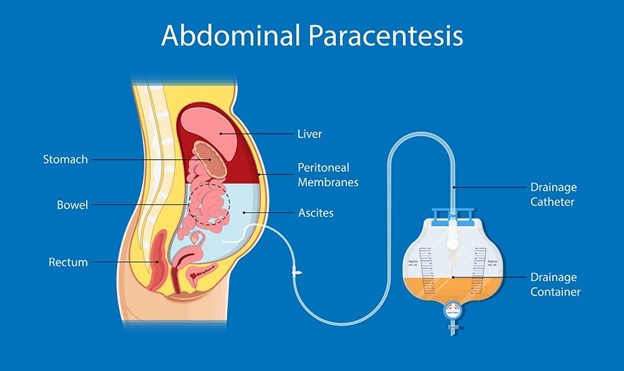A nurse is planning care for a group of clients. The nurse should expect to witness an informed consent for a client who will undergo which of the following procedures?
Administration of an enema.
Performance of a paracentesis.
Insertion of an indwelling urinary catheter.
Placement of an NG tube.
The Correct Answer is B
The correct answer is choice B: Performance of a paracentesis.
Choice A rationale:
Administration of an enema does not require informed consent in the same way that invasive procedures do. Enemas are typically considered routine nursing interventions and are not as invasive as the other options.
Choice B rationale:
This is the correct choice. A paracentesis is an invasive procedure that involves puncturing the abdominal cavity to withdraw fluid. Informed consent is required for procedures that carry potential risks, and paracentesis falls into this category due to the risk of complications such as infection, bleeding, or organ injury.

Choice C rationale:
Insertion of an indwelling urinary catheter is a common nursing procedure that, while invasive, does not typically require informed consent. However, the nurse should still explain the procedure to the client and obtain verbal consent, but it's not the same level of formal informed consent required for more invasive procedures.
Choice D rationale:
Placement of an NG tube, although uncomfortable, is not as invasive as a paracentesis. In most cases, NG tube placement is considered a medical or nursing intervention rather than a procedure that necessitates formal informed consent.
Nursing Test Bank
Naxlex Comprehensive Predictor Exams
Related Questions
Correct Answer is B
Explanation
The correct answer is choice B. "Tighten your stomach muscles.” This is because when turning an immobile client in bed, it’s important to use proper body mechanics to prevent injury. Tightening the stomach muscles helps to stabilize the core, which supports the spine and can help prevent back strain.
Choice A rationale:
"Keep your feet close together” is wrong because having a wide base of support with the feet apart provides better balance and stability when turning a client in bed.
Choice C rationale:
"Straighten your knees” is wrong because you should keep your knees slightly bent to maintain balance and allow for a smooth transfer of weight as you turn the client.
Choice D rationale:
"Bend at your waist” is wrong because bending at the waist increases the risk of a back injury. It’s important to bend the knees and keep the back straight when leaning over to turn a client.
Correct Answer is ["13.6"]
Explanation
The correct answer is 13.6 kg.
To convert pounds to kilograms, the formula is weight in pounds divided by 2.2. Given the child's weight is 30 lb, the calculation would be 30 / 2.2 ≈ 13.64 kg. Rounding to the nearest tenth gives us 13.6 kg.
Whether you are a student looking to ace your exams or a practicing nurse seeking to enhance your expertise , our nursing education contents will empower you with the confidence and competence to make a difference in the lives of patients and become a respected leader in the healthcare field.
Visit Naxlex, invest in your future and unlock endless possibilities with our unparalleled nursing education contents today
Report Wrong Answer on the Current Question
Do you disagree with the answer? If yes, what is your expected answer? Explain.
Kindly be descriptive with the issue you are facing.
